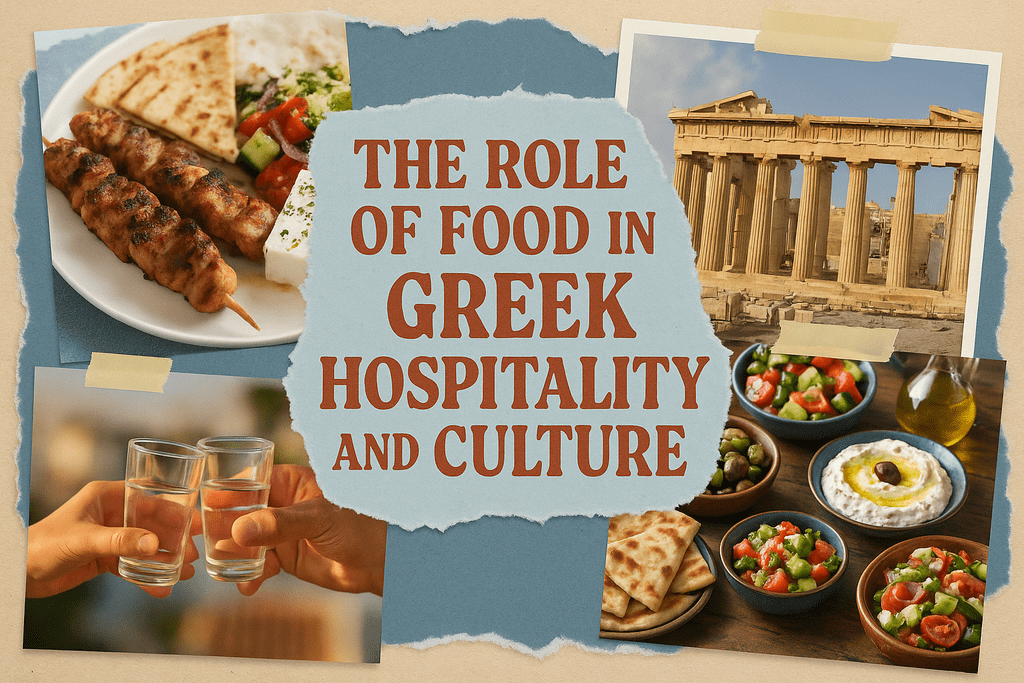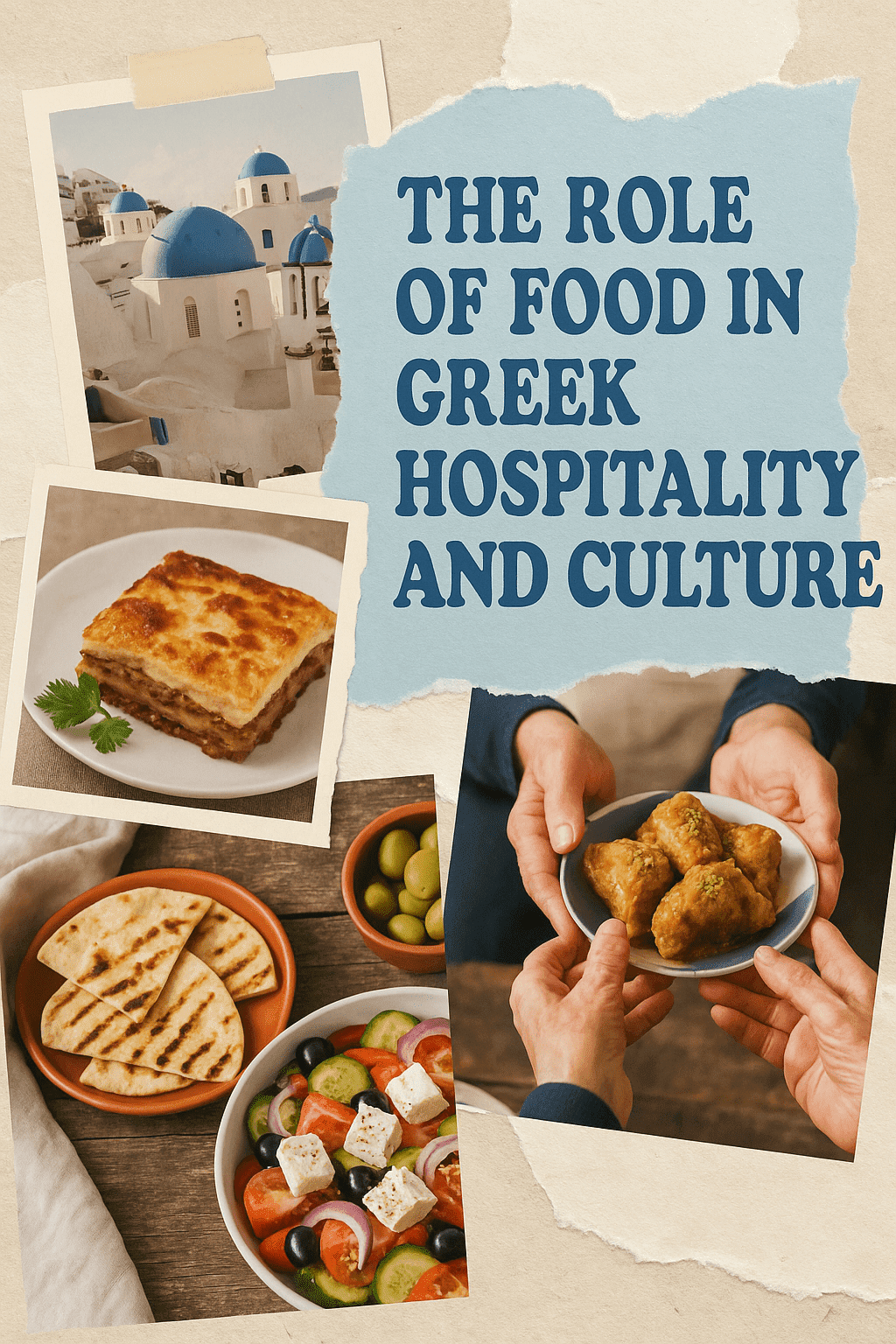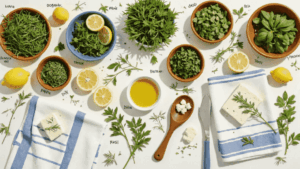The Role of Food in Greek Hospitality and Culture
Ever had the pleasure of joining a Greek family for dinner? If yes, you know exactly what I’m talking about—if not, my friend, you’re seriously missing out! Picture this: heaps of aromatic dishes, endless laughter echoing through cozy kitchens, and a never-ending stream of “eat, eat, there’s more!” Trust me, Greek hospitality revolves so much around food that you’ll leave wondering how you survived this long without experiencing it.
Greek Hospitality: It All Starts with Food
In Greece, hospitality—or “philoxenia,” meaning the love of strangers—isn’t just an idea; it’s practically a religion. And the primary ritual? You guessed it—food! Greeks believe feeding their guests well is a direct reflection of their generosity and kindness. It’s not unusual to hear stories (or personally witness) Greek moms frantically cooking up a feast because one person casually mentioned they’re bringing a friend. Seriously, I once mentioned an extra person was coming, and within an hour, there were six extra dishes on the table. Talk about commitment!
Food as an Expression of Love
Here’s a fun fact: Greeks rarely say “I love you” directly. Instead, they feed you until you’re about to burst. It’s their love language! Whether it’s yiayia’s (grandma’s) famous moussaka or dad’s grilled souvlaki, every dish is served with a generous helping of affection. Trust me—if you’re not being overfed, you’re not truly being hosted Greek-style. 🙂
Meals as Social Events
Forget the quick bite; Greek meals are marathon events. Ever sat through a Sunday family lunch in Greece? Hope you cleared your schedule because it might just last till dinner. Meals aren’t just about eating; they’re about bonding. Greek culture emphasizes leisurely meals filled with conversations, debates, jokes, and even the occasional family drama (which FYI, is just as flavorful as the food).
Must-Have Greek Hospitality Dishes
Let’s dive into a quick, mouth-watering overview of classic dishes you’ll find at any Greek table:
- Moussaka: Layers of eggplant, potatoes, minced meat, and creamy béchamel sauce—basically comfort in casserole form.
- Souvlaki: Skewers of juicy grilled meat served with pita, fresh veggies, and heaps of tzatziki. A true crowd-pleaser.
- Dolmades: Stuffed grape leaves filled with rice, herbs, and sometimes minced meat. One bite, and you’ll see why Greeks are obsessed.
- Spanakopita: Spinach pie wrapped in crispy phyllo dough. It’s literally impossible to stop after one piece—I’ve tried!
Celebrating Traditions and Festivals with Food
Greek holidays revolve around food even more intensely than everyday meals—if that’s even possible. Easter is the prime example. Ever seen a whole lamb roasting on a spit? Welcome to Greek Easter. Families spend hours roasting meat, baking tsoureki (sweet bread), and dyeing eggs red. Food isn’t just tradition; it’s symbolic. The roasted lamb symbolizes sacrifice, and red eggs represent rebirth. Plus, it’s a great excuse for Greeks to argue over whose lamb roasting technique reigns supreme—spoiler alert: it’s always their own.
The Role of Greek Tavernas
If you’ve ever visited Greece, you’ve probably spent delightful evenings at tavernas—those quaint, welcoming eateries that line every street corner and village square. Tavernas aren’t just restaurants; they’re community hubs. The vibe is relaxed, the food is spectacular, and the welcome is genuinely warm. You’ll often see large groups gathered around long tables, laughing loudly, sharing plates, and generally living their best lives. Honestly, IMO, every culture needs a version of a Greek taverna. Why haven’t we all adopted this yet?
Cooking as Cultural Heritage
Cooking in Greece isn’t just a daily chore—it’s a sacred rite passed down through generations. Recipes are treasured heirlooms, guarded as fiercely as family secrets. Ask any Greek for a recipe, and you’ll probably get vague answers like “a bit of this” and “just enough of that” because no one ever measures anything. Cooking is instinctive, passionate, and deeply personal. It’s not uncommon for grandmothers to quiz potential spouses on their cooking skills—seriously, it’s a whole thing.
Food’s Connection to the Land
Greek cuisine relies heavily on local, fresh ingredients. Olive oil, feta cheese, fresh seafood, ripe tomatoes, herbs picked straight from the garden—each bite connects you directly to the land and sea of Greece. Greeks are intensely proud of their culinary heritage, and why shouldn’t they be? The Mediterranean diet isn’t just tasty—it’s been scientifically proven to enhance longevity and happiness. Now, that’s a combo I can get behind!
Hospitality Beyond Borders
Greeks carry their hospitality wherever they go. Ever visited a Greek restaurant outside of Greece? Chances are, you’ve encountered this warmth firsthand. Greeks abroad recreate this spirit by offering generous portions, friendly conversations, and often, a shot of ouzo on the house. FYI, ouzo is potent—proceed with caution unless you’re planning on singing Greek songs loudly by the end of the night (which honestly, is a great idea).
Why Does Greek Food Matter So Much?
Think about it—why is food so central to Greek hospitality? Simply put, food creates connections. It’s a universal language that bridges cultures, breaks barriers, and builds community. Sharing a meal with someone instantly creates a bond, turning strangers into friends and friends into family. So, next time you’re invited to a Greek meal, remember: you’re not just eating; you’re being welcomed into someone’s heart and heritage.
Wrapping Up (But Saving Room for Dessert!)
Food in Greek culture isn’t just about nourishment—it’s about celebrating life, love, and connection. Whether through family gatherings, vibrant festivals, or casual tavernas, Greek hospitality is an art form best experienced with an empty stomach and an open heart.
Next time you’re offered a plate in Greece, don’t hesitate—grab a fork, pull up a chair, and savor the delicious tradition that’s been thousands of years in the making. Who knows, you might just leave a bit more Greek than when you arrived.







